- [국외 인터뷰] Just Blaze - 곡을 만든다는 건 아이를 갖는 것과 같다
- rhythmer | 2014-11-02 | 26명이 이 글을 추천하였습니다.
-
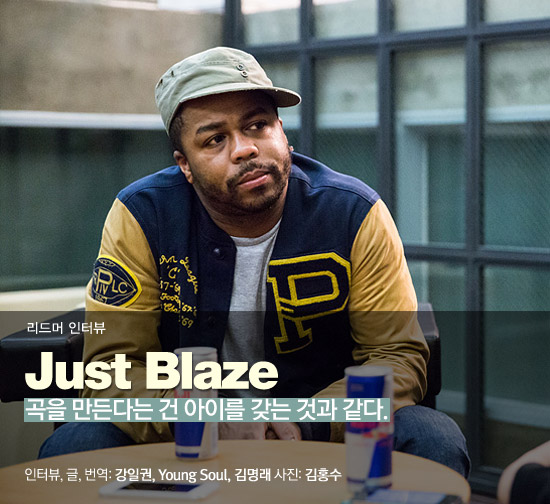
"Girls, Girls, Girls" (Jay Z), "Song Cry" (Jay Z), "Oh Boy" (Cam'ron), “Tough Luv” (Young Gunz), "I Really Mean It" (The Diplomats), "Can't Let You Go" (Fabolous), "Pump It Up" (Joe Budden), "Touch the Sky" (Kanye West), "Compton" (Kendrick Lamar)1999년 본격적으로 커리어를 시작한 이래 수많은 힙합 스타들과 작업하며 명곡을 쏟아낸 저스트 블레이즈(Just Blaze)는 자타가 공인하는 세계 최고의 힙합 프로듀서 중 한 명이다. 특히, 그는 제이 지의 힙합 클래식 [The Blueprint]에서 칸예 웨스트(Kanye West)와 함께 샘플링 작법의 한 획을 그으며, 거장의 반열에 오르는 기틀을 마련했다. 그런 그가 지난 10월 25일 토요일, '레드불 아카데미 클럽의 밤' 행사의 일환으로 내한했고, 리드머는 이 죽여주는 프로듀서와 인터뷰를 가질 수 있었다. 힙합과 디제잉에 빠지게 된 계기, 비트메이커(Beatmaker)와 프로듀서(Producer) 사이의 경계, 샘플링을 둘러싼 논란, 트랩 뮤직(Trap Music)과 오늘날 힙합 씬에 대한 견해 등등, 그가 만든 음악만큼이나 생생했던 저스트 블레이즈의 답변을 전한다.
리드머 (이하 '리'): We’re so glad to interview you. How did you first fall in love with Hip-hop? What made you become a producer?
이렇게 인터뷰하게 되어 반갑다. 가장 원초적이지만, 가장 궁금한 질문부터 하겠다. 당신이 처음 힙합에 빠져든 건 언제였나? 프로듀서가 되어야겠다고 맘 먹은 계기도 궁금하다.
Just Blaze (이하 'J'): A. I first started out as a DJ, and for me, production, or producing music was just a natural extension of DJing. You know, I grew up around father played the jazz organ, so I was always around music. Whether it be my father playing it, my mother singing it, or my cousin going record shopping every weekend. There was no one particular moment. It was just something that was always around me. It kind of just happened.
내가 처음 음악을 시작한 것은 디제이로서였다. 그리고 내 생각에, 프로듀싱이라는 건 단순히 디제잉을 하다 보면 손대게 되는 일 같다. 음, 내가 어릴 적 우리 아버지는 재즈 오르간을 연주하셨고, 그래서 내 곁에는 항상 음악이 있었다. 아버지가 재즈를 연주할 때나, 어머니가 노래를 부를 때, 혹은 사촌이 매주 주말 음반을 사러 갈 때 항상 그랬다. 그래서 (힙합과 처음 사랑에 빠진) 특별한 순간이 있지는 않았다. 그냥 내 주변에 항상 존재했던 것이다. 어떻게 보면 저절로 일어난 일이라고 생각한다.
리: So the shift from a DJ to a producer was just natural?
그러니까 디제이에서 프로듀서로 자연스럽게 넘어가게 되었다는 얘긴가?
J: Yeh, I mean even when I was young and first only know how to DJ, I was also making music. I didn’t know what producing was, I just knew that I was making music. So it’s kind of just an extension of who I am really. And I think the more I became well versed in DJing, and the more I learned about DJing, one of the things that I learned without realizing I was learning it, was how music affects people, what makes a good song, how music is structured, how music is written, you know, the concept of counting bars and beats. So it all kind of just fell together. And if you look back historically, not all, but many of the best producers have started out as DJs.
그렇다. 어릴 때, 디제잉 밖에 몰랐던 시절에조차 나는 음악을 만들고 있었던 셈이다. 당시 나는 프로듀싱이 무엇인지 몰랐다. 단지 음악을 만든다는 것만 알았지. 그러니까 나의 본질로부터 자연스럽게 뻗어나온 것이었던 셈이다. 그리고 내 생각엔, 디제잉에 능숙해 질수록, 그리고 디제잉에 대해 더 많은 것을 배울 수록, 나도 모르는 사이에 음악이 어떤 식으로 사람에게 영향을 끼치는지, 무엇이 좋은 노래를 만드는지, 어떻게 음악이 구성되는지, 곡을 쓴다는 건 어떻게 이루어지는지, 뭐 마디나 박자를 센다는 컨셉트라던가, 이런 것들에 대해 배우고 있었던 듯하다. 그러니까 그 모든 것이 한번에 일어났다고 볼 수 있다. 역사적으로도 위대한 프로듀서 전부는 아니더라도 상당수가 디제이로 시작했다.
리: Is there a difference between a beat maker and a producer?
(한국 힙합 팬들을 위해) 비트메이커와 프로듀서의 차이점에 대해 얘기해 줄 수 있나?
J: Yeh, there’s a huge difference between a beat maker and a producer. A producer may never touch an instrument. Historically, if you look back, the concept of the producer has existed way longer than Hip-hop has existed. So really what is comes down to is, there are some producers who will also make beats or do programming. But if you look at Quincy Jones for example, he’s not sitting there playing every string himself and playing all the drums himself, and you know, playing the piano. That doesn’t mean he can’t, but he has a producer’s job to deliver an overview song, a vision, and make a vision come to reality. But there are some beat makers or programmers who are also producers and that’s great. The more you can do, the better. But you could make a beat, for example, and give it to an artist. Then the artist does what they do, and never see that beat maker again, ever. And that beat maker doesn’t actually do anything with the song, they just make the beat. Then what are you really producing? Nothing, in terms of the song. At that point, you made the beat, you programmed it, and you wrote the music, but you’re not actually producing. But like I said, a producer may never touch an instrument, or the machine, or the sequencer. The producer is there to deliver the final product, he there to deliver his vision, put his touch on it, pull out the best performance out of the musicians and the artists, and deliver the best song he can.
그렇다. 비트 메이커가 되는 것과 프로듀서가 되는 것엔 큰 차이가 있다. 프로듀서는 악기를 한 번도 건드려본 적 없이도 될 수 있다. 역사적으로 프로듀서라는 컨셉트는 힙합보다 훨씬 전부터 존재했다. 그러니까 말하자면, 어떤 프로듀서들은 비트를 만들거나 드럼을 프로그래밍한다. 하지만 가령 퀸시 존스(Quincy Jones) 같은 이를 보자면, 그는 자기가 직접 스트링을 연주한다거나, 드럼을 친다거나, 피아노를 치지 않았다. 그가 할 수 없었던 것은 아니지만, 프로듀서로서 역할은 노래 전반을 지휘하는 것이기에 그랬던 것이다. 하지만 어떤 비트메이커들은 프로듀서이기도 하고, 그건 그들에게 좋은 일이다. 더 많은 것을 할 줄 알수록, 더 좋은 일이기 때문이다. 하지만 만약 당신이 비트를 만들어서, 그걸 어떤 뮤지션에게 준다고 치자. 그리고 뮤지션은 자신이 알아서 작업하고, 그 비트메이커를 만나지 않는다고 하자. 다시는. 그럼 그 비트메이커는 노래의 실제 작업에 전혀 참여하지 않은 셈이다. 그냥 비트만 만든 거지. 대체 무엇을 ‘프로듀싱’했단 말인가? 곡 전반으로 보면, 아무 것도 하지 않은 것이다. 그러니까 비트를 만들고 프로그래밍을 하고, 곡을 썼어도 그걸 실제로 프로듀싱하진 않았다는 것이다. 그러나 내가 앞서 말했듯이 프로듀서는 악기나 샘플러, 시퀀서 따위에 손가락 하나 대지 않아도 된다. 프로듀서는 완성된 작품을 탄생시키기 위해 존재하며, 그의 비전을 실체화하기 위해, 입김을 불어넣고, 음악인들로부터 최고의 모습을 뽑아내기 위해, 그리고 가장 훌륭한 곡을 탄생시키기 위해 존재하는 것이다.
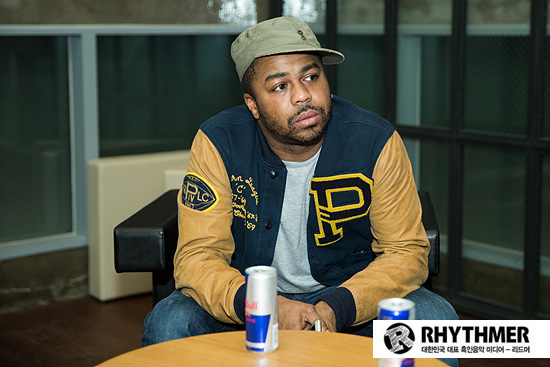
리: The first time I really started to listen deeply into your music was Jay-Z’s [Blueprint] and you got really big with that album, with you sampling methods. What do you think are some crucial elements for a good song with sampling?당신은 [The Blueprint] 앨범에서 칸예 웨스트(Kanye West)와 함께 샘플링 작법의 한 획을 그었다. 힙합 팬들은 샘플링에 정말 관심이 많은데, 샘플링으로 곡을 만들 때 당신이 가장 중요하게 생각하는 부분은 무엇인가?
J: I know it sounds cliché, but the only thing that’s crucial to anything is “is it good?” I don’t care if it’s made by people tapping on pencils. If it’s a good song, it’s a good song. There’s no key thing to look for in a sample, because I will listen to a record and hear one thing, you can listen to a record and hear something else. And they could all end up being very good. Or we could all find the same sample but do completely different things with it. So there’s really no set thing to look for. It’s just really to look for what sounds good to you, or inspires you.
굉장히 뻔한 이야기라는 걸 알지만, 언제나 딱 한가지가 중요하다. ‘좋은 곡인가?’ 하는 문제 말이다. 설령 누군가가 연필을 책상에 쳐서 음악을 만든대도 나는 상관하지 않는다. 좋은 노래는 좋은 노래다. 샘플에서 딱히 주의를 기울여야하는 키-포인트가 있지는 않다. 내가 음악을 들으며 이것을 느낀다면, 당신은 다른 곡을 들으며 또 다른 것을 느낄 테니 말이다. 그리고 둘 다 좋은 곡이 될지 모르는 거니까. 같은 샘플을 찾았다고 해도, 그것을 가지고 전혀 다른 작업을 할지도 모른다.그러니 샘플에서 꼭 주의를 기울여야 하는 특정 요소가 있는 것은 아니다. 단지 어떤 것이 당신에게 좋게 들리는가, 혹은 당신에게 영감을 주는가의 문제다.
리: 한국에서 샘플링 이슈는 큰 화젯거리다. 클리어런스, 프레이즈 관련, (진정한 의미의) 음악이냐 아니냐 등등. 샘플링을 둘러싼 이러한 이슈에 관한 당신의 생각을 듣고 싶다.
In Korea, the sampling issue is becoming big, in terms of clearance, phrase sampling, and the question whether is sophisticated music or not. What are your thoughts on these issues regarding sampling?
J: in terms of whether or not it’s actual music, it is an art form. It takes a special person to be able to listen to a 4 minute song and hear 3 seconds and say “that’s the part.” You know what I mean? Because it’s not always that obvious. There are times where I heard things that nobody else heard and people were like “Dude, how did you figure that out?” But there are times I’ve asked that questions to a ton of other people, “how did you think to do that with that one little part?” So there’s really no formula. But there is an art form to it and there is a genius to it.
(샘플링으로 만들어진 음악이) 진정한 음악인가 아닌가 하는 질문에 대해서는, 일종의 예술 형태(아트 폼)라고 생각한다. 4분짜리 노래를 들으며 단 3초를 잡아내고 ‘이거다’라고 말하기 위해선 특별한 재능이 필요하다. 무슨 말인지 알겠는가? 그게 항상 그렇게 쉬운 일은 아니기 때문이다. 종종 나는 다른 사람들이 전혀 듣지 못하는 부분을 잡아내곤 한다. 그러면 사람들은 ‘그걸 어떻게 안 거야?’라고 묻곤 하지. 하지만 나 역시 엄청나게 많은 사람들에게 그 질문을 하곤 했다. ‘그 짧은 부분을 가지고 어떻게 그런 생각을 한 거야?’라고. 그러니 어떤 매뉴얼이 있는 것은 아니다. 하지만 (샘플링은) 하나의 예술 형태며, 천재성을 요구한다.
리: Are you a genius to it?
당신은 천재인가?
J: No, I’ve had genius moments, I don’t consider myself a genius by any means, but that’s not for me to decide, I don’t think.
아니다. 번뜩이는 순간들은 있었지. 나는 결코 자신을 천재라 생각하지 않는다. 내가 결정할 문제는 아니지만.
리: Well, we think you’re a genius.
우린 천재라고 생각하는데.
J: Thank you
고맙다.
(전원 웃음)
리: I saw a lot of your videos on YouTube bumping with the MPC. Do you still maintain the same workflow?
유튜브에서 MPC 사용하는 걸 옛날부터 인상 깊게 봤는데, 아직 비슷한 작업 프로세스를 유지하는가?
J: I don’t really use an MPC anymore. I haven’t in a very long time. But I still use the same mentality, the same approach. I don’t think my approach ever changes. Because again, we could sit here and make a great record with a cassette recorder and some pencils banging on the table. You know what I mean? So the approach doesn’t change. Technology might change. Technology’s supposed to change. That’s how we advance.
더 이상 MPC를 사용하지 않는다. 사용하지 않은지 꽤 오래된 것 같다. 하지만 여전히 같은 자세로, 같은 접근법으로 작업한다. 이 방식이 앞으로도 변할 것 같지는 않다. 왜냐하면, 다시 말하지만, 여기 앉아서 카세트 레코더와 연필을 책상에 때려대는 것만으로도 훌륭한 노래는 탄생할 수 있기 때문이다. 무슨 말인지 알겠는가? 그러니 접근법이 딱히 바뀌지는 않는다. 기술은 변화하겠지. 변화하는 것이 기술이다. 그렇게 우리는 발전하는 것이다.
리: And you are still digging through the vinyl?
여전히 바이닐(Vinyl) 디깅에도 한창인지?
J: I still buy records here and there, but I don’t have the time and the room to buy the way I used to. But I always love vinyl and I always buy records. After a while, you run out of room.
여전히 여기저기에서 레코드 판을 사곤 한다. 하지만 예전에 그랬던 것처럼 그렇게 사들일 공간도, 시간도 없다. 그러나 난 여전히 바이닐 판을 사랑하고, 항상 레코드 판을 사들이곤 한다. 시간이 지나면 방에 가득 차곤 하지.
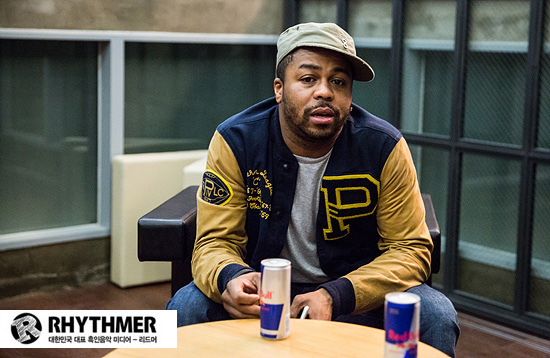
리: In our previous interview with Big K.R.I.T, he mentioned your name as one of the producers he would really like to work with in the future. What are your thoughts?일전에 Big K.R.I.T은 우리와 인터뷰에서 함께 작업해보고 싶은 프로듀서 중 한 명으로 당신을 꼽았다. 당신 생각은 어떤가?
J: He’s dope. The thing I like about him is that he is an all around artist. He writes his music, he makes it with his own beats, he produces himself, he’s an all around artist. And a lot of people who are like that, make their own best music. So I’m honored that he would want to work with me. That’s dope. I think he’s good.
그는 훌륭하다. 내가 그를 좋아하는 이유는 다재다능함이다. 그는 자신의 곡을 쓰고, 그걸 자신이 직접 만든 비트 위에 얹고, 스스로 프로듀싱까지 한다. 그는 올-어라운드 음악인이다. 그리고 많은 사람들이 그렇게 한다. 최고의 곡을 바로 자신의 손으로 만드는 것이다. 그래서 빅 크릿이 나와 함께 작업하고 싶어한다는 사실이 자랑스럽다. 무척 멋진 일이다. 그 친구는 잘하니까.
리: We really like your work with Saigon’s first album, but we recognized that you weren’t on his latest album. Do you have plans to work with him on his next?
사이공(Saigon)의 [The Greatest Story Never Told]는 당신의 비트는 물론, 총괄 프로듀싱이 빛을 발한 죽여주는 작품이었다. 그런데 이번에는 아예 참여하지 않았더라. 그와 작업할 계획이 있는지 궁금하다.
J: I don’t make plans. Whatever happens, happens. I didn’t make a conscious decision to not work with him. I’ve been touring, he’s been working on an album. I still did the intro, because he’s still like family to me regardless. So I still give him my blessings on the beginning of the album. I didn’t produce anything, but whenever he’s working, he brings it to me, I listen to it, give him my guidance, and help him make the best he can.
나는 계획 같은 것을 짜지 않는다. 일이 생기면, 일이 생기는 것이다. 나는 딱히 의식적으로 누군가와 일하지 않으려고 한 적이 없다. 나는 투어 중이었고, 그는 앨범 작업 중이었다. 여전히 그는 내 가족 같은 존재였으니, 그 앨범의 인트로를 작업했다. 그에게 축복을 보낸 것이다. 나는 아무 것도 프로듀싱하지 않았지만, 그가 작업할 때마다 그 결과물을 내게 가져오곤 한다. 나는 그걸 듣고, 그에게 조언을 주고, 그가 할 수 있는 최대한을 이끌어낼 수 있도록 도와준다.
리: And you mentioned last year that you have a song with Jay-Z called “Song Cry2”
작년에 당신은 제이지(Jay Z)와 함께한 "Song Cry 2"라는 곡이 있다고 밝혔는데,
J: Yeh, it was kind of a spiritual successor of “Song Cry.” It was called “Hello Young Lady,” but we never put it out.
그렇다. 그건 “Song Cry”와 같은 맥락에 놓여있는 곡이었다. “Hello Young Lady”라는 제목이었지만, 발표하지는 않았다.
리: Do you have plans to reveal it?
공개할 건가?
J: It’s not my call to reveal. I’m not the record label.
내겐 공개할 권리가 없다. 난 레이블이 아니니까.
리: What do you think about Trap music and its relevance in Hip-hop right now?
트랩 뮤직(Trap Music)에 대해선 어떻게 생각하나? 오늘날 힙합과 중요한 관련이 있는데.
J: Trap is awesome. The sound always has to change, it always has to evolve. If it stayed the same for a long time, it would be boring. We would just stop listening to it. So every couple of years, the sound changes, the shift changes, the influence changes. But I have no issues with Trap music at all. I play a lot of Trap music. So at the end of the day, I don’t care what genre it is, I don’t care who made it. As long as it sounds good, makes you feel good.
트랩은 끝내주는 음악이다. 음악은 항상 변하고, 진화해야 한다. 같은 형태로 오래 남아 있다면, 지루할테니 말이다. 사람들은 그런 음악을 더 이상 듣지 않을 것이다. 그렇기에 몇 년마다 사운드가 변화하는 것이고, 음악 씬의 경향이 변화하고, 영향을 준 음악인들이 변화하는 것이다. 그러나 나는 트랩을 싫어하지 않는다. 트랩을 많이 트는 편이다. 결국에는 이게 무슨 장르인지, 누가 만든 것인지 신경 쓰지 않게 된다. 그냥 듣기 좋다면, 사람들을 기분 좋게 만든다면 충분하다.
리: We think a lot of the criticism is that every Trap music is starting to sound similar.
사운드가 너무 획일화되고 있다는 점에서 비판의 소지가 있는 것 같다.
J: That’s true. But if you think about it, after we did the “Blueprint,” a lot of rap music started to sound similar to the “Blueprint.” It’s what happens.
그건 사실이다. 하지만 이 생각을 해보자. 우리가 [The Blueprint]를 내놓자, 다른 많은 랩 앨범들이 그와 비슷한 사운드를 내놓았다. 그냥 그런 것이다.
리: So is it just a trend?
그럼 단지 트렌드의 차원일까?
It’s not just a trend thing. That means that the people who founded the foundation of that sound, obviously had a huge impact on the culture. Every few years, somebody comes up with a sound that changes the culture. That’s how all art works really. You know, from movies, to writing, to music, that’s how art works in general. Somebody comes every few years that changes the game, and a new ripple starts.
단순히 트렌드만의 문제는 아니다. 그 사운드를 만든 사람들이 이 문화에 큰 영향을 끼치고 있음을 의미한다. 몇 년마다 누군가가 이 문화를 바꿔놓는 사운드와 함께 나타난다. 그게 이 판이 돌아가는 방식이다. 음, 영화에서 문학에 이르기까지, 이건 문화계의 전반적인 모습이다. 누군가가 판을 바꿔놓는 무엇인가를 몇 년에 한 번씩 가지고 나타나면, 거기서 새로운 갈래가 시작된다.
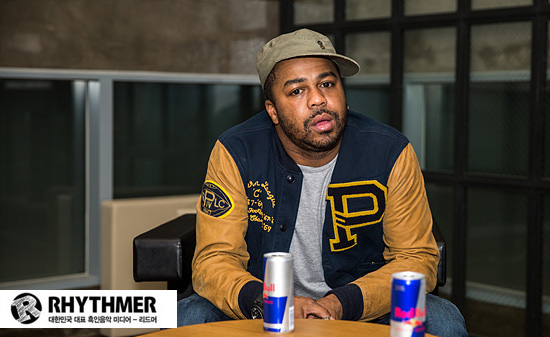
리: You worked with a lot of greats in Hip-hop, who do you remember as the best to work with?지금까지 수많은 힙합 스타와 실력자들과 작업해왔다. 그중 최고의 순간은 누구와 작업할 때였나?
J: There’s no such thing as the best person to collaborate with. I’ve made a lot of great music with a lot of great people. And for me to say that one is better than the other would do disservice to the song. Because the song is the most important. At certain point, it’s not about me or the artist, it’s about the song that we made together. Obviously, me and Jay had a great run, but I’ve done a lot of good work with a lot of artists. Making songs is like having children. You can’t pick your favorite one, you love all your kids for different reasons, but mainly because they’re your kids and they came from you.
‘가장 일하기 좋은 사람’ 같은 것은 존재하지 않는다. 난 많은 멋진 이들과 훌륭한 음악을 많이 만들어내었다. 그리고 누군가가 다른 사람들보다 낫다고 말한다면, (지금까지 만들어낸) 음악에 대한 모욕이 될 것이다. 음악이야말로 가장 중요한 것이기 때문이다. 어느 순간, 나나 나와 함께 하는 음악인이 아니라, 우리가 같이 만드는 음악이야말로 가장 중요한 문제가 된다. 나와 제이지는 알다시피 훌륭한 팀워크를 보여주었지만, 나는 다른 여러 음악인들과도 멋진 작업을 했다. 곡을 만든다는 건 아이를 갖는 것과 같다. 가장 마음에 드는 걸 선택할 수가 없다. 모든 아이를 각기 다른 이유로 사랑하지만, 무엇보다 그들이 당신 아이이며, 당신에게서 나왔기에 사랑할 수 밖에 없는 것처럼.
리: Cool. On the “Compton” track you did with Kendrick, who’s idea was it to go max-out on the West Coast vibe at the end?
멋지다. 켄드릭 라마(Kendrick Lamar)와 함께한 "Compton"의 마지막 부분에서 웨스트코스트 바이브를 넣은 건 누구 아이디어였나?
J: That was me. Dre rhymed in that song, but I actually produced it. That was just fun. He’s gonna rap about Compton, might as well go West Coast.
그건 내 아이디어였다. 닥터 드레(Dr. Dre)가 그 곡에서 랩을 하긴 했지만, 프로듀싱을 한 것은 나였다. 재미있는 경험이었다. 그는 컴튼에 대해 랩을 하고, 나아가 웨스트코스트 전체에 대해 얘기한다.
리: Do you have any advice for young aspiring beat makers and producers?
비트메이커, 혹은 프로듀서를 꿈 꾸는 이들에게 뼈가 되고 살이 되는 조언 부탁한다.
J: Depends on what they want out of their life or their career. The days of sending out your beats on a CD or the demo tape days are dead. These days are more or so about, I think, creating your own movements, being your own hype machine, finding artists that you believe in, that believe in you and starting your own movement locally, and let the masses come to you.
그들이 삶이나 커리어에서 무엇을 원하는지에 따라 다르다. CD나 데모 테입에 비트를 담아 뮤지션들에게 보내던 시절은 지났다. 요즘은 뭐랄까, 내 생각엔 자신이 직접 흐름을 주도하고, 자기 자신의 홍보인이 되고, 자신이 기대하는 아티스트를 찾고, 자신을 믿어주는 아티스트를 찾아서 작은 규모로라도 자신의 흐름을 만들어 대중이 내게 오게끔 하는 것이 대세인 듯하다.
리: What are your set plans for the near future?
앞으로 계획은 뭔가?
J: We’re trying to finish up the new Slaughterhouse. I have a new record on Eminem’s Shady Compilation, the retrospective album that’s coming out. I’m really trying to get off of the road and get back into the studio. Starting probably in January. I’ve been touring for almost 2 years straight. That’s been fun, but it’s time for me to get back to it.
새 슬로터하우스 앨범을 마무리 짓고 있다. 에미넴의 셰이디 컴필레이션 앨범에도 하나 작업 중이다. 앨범은 지난 과거를 기념하는 형식이며, 곧 나올 예정이다. 투어를 끝내고 스튜디오로 돌아가려 노력하는 중이고. 아마 1월 즈음에나 그럴 수 있을 것 같다. 무려 2년 동안 쉴 새 없이 투어를 하는 중이다. 재미는 있었지만, 이제 돌아갈 때다.
리: But I think I’ve been hearing that from you for the past few months.
근데 (스튜디오로 돌아가야 할 때라는) 그 소리는 몇 달 전에도 들었던 것 같은데.
J: Yeh, but things kept coming up. But the thing you also got to remember is that most things get book 6 to 9 months in advance. So it’s now approaching that point where the shows are starting to get less. 8, 9 months ago I had to tell my agents to slow things down a bit. It’s not like I could say that in August and go back to the studio in September, because if I say that in August, I’m already booked for 6 months. So it all takes a long time.
그렇다. 하지만 계속 일이 생겼다. 또 기억해야 할 것은, 대부분의 일들이 6개월내지는 9개월 전에 이미 잡혀있다는 점이다. 때문에 이제는 공연 스케줄이 좀 여유있는 편이다. 8,9달 전에 나는 에이전트에 연락해서 스케줄을 좀 천천히 잡아달라고 부탁한 적이 있다. 내가 8월에 스튜디오로 돌아가겠다고 말했다고 해서 9월부터 바로 스튜디오 작업을 할 수 있는 것은 아니다. 내가 8월에 그런 말을 했다면, 그 시점으로 6개월은 이미 스케줄이 잡혀있는 상태니까. 그래서 오래 걸린다.
리: Lastly, Could you pick 3 of your favorite beats that are not yours?
끝으로 당신의 것을 제외하고 생애 최고의 비트 3개를 뽑는다면?
J: That’s tough.
너무 어렵다.
(한참 고민 후)
Main Source “Looking at the front door,” Wu-Tang “Protect Ya Neck,” and “Espacism” by Pete Rock & CL Smooth. Those are 3 that I love, but if you ask me tomorrow you might get a different answer.
메인 소스의 “Looking at the Front Door”, 우탱의 “Protect Ya Neck”, 그리고 피트 록 & 씨엘 스무스의 “Escapism”을 꼽겠다. 이 세 노래들은 내가 사랑하는 곡이지만, 내일 당신이 같은 질문을 던진다면 답이 바뀔지도 모르겠다.
*인터뷰 성사에 도움을 준 레드불 관계자 여러분에게 감사를 표합니다.26
-

-
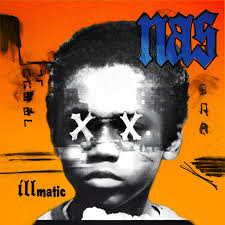
- 랩퍼엔 (2014-11-07 17:47:25, 211.56.190.***)
- 우오오오 좋은 인터뷰 잘 봤습니다!
I don’t care if it’s made by people tapping on pencils. If it’s a good song, it’s a good song. - 대가의 경지에 이른 사람만이 할 수 있는 표현이네요!
-

- 0r트모스 (2014-11-02 16:04:21, 119.195.135.***)
- 저스트블레이즈~
인터뷰 잘봤습니다. 역시 멋진 생각을 가진 사람이네요
-
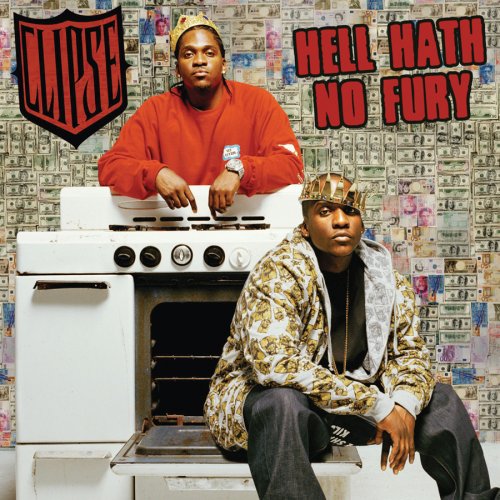
- 윤정준 (2014-11-02 13:30:41, 220.86.161.***)
- 젓 블레이~즈!!!!!
-

- 이건후 (2014-11-02 11:14:50, 125.178.110.**)
- Swag!
-
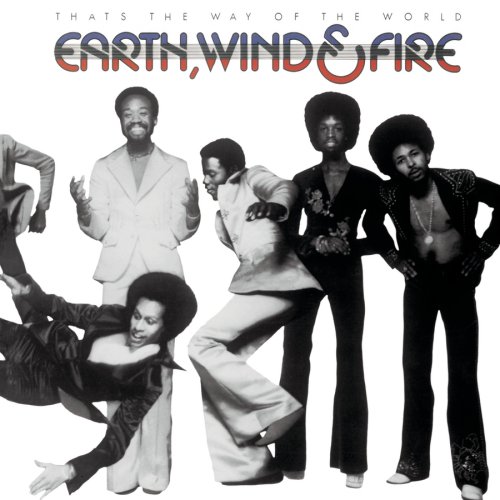
- Dopeman (2014-11-02 10:59:48, 211.243.228.**)
- 저스트 블레이즈라니... ! 인터뷰 잘봤습니다!
-

- 응애 (2014-11-02 10:30:32, 121.65.28.***)
- 저스트블레이~ shit 진짜 잘봤습니다







